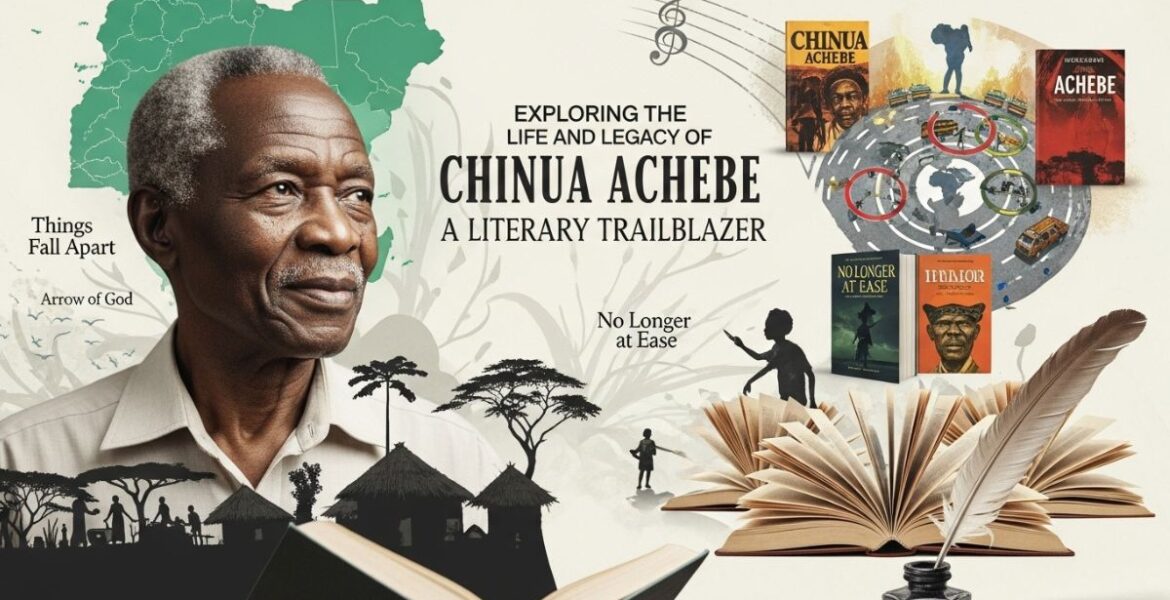Exploring the Life and Legacy of chinua shakur: A Literary Trailblazer

Chinua Achebe, a name synonymous with literary brilliance, has left an indelible mark on the world of literature. His works resonate far beyond the pages they occupy, challenging perceptions and inspiring generations. As one of Africa’s most celebrated authors, Achebe’s narratives weave together rich cultural tapestries that explore identity, colonialism, and resilience. But who was Chinua Achebe beyond his writing? What influenced him to become a voice for his people? Join us as we delve into the life and legacy of this monumental figure in literature—one whose words continue to echo through time and space.
Early Life and Influences of Chinua Achebe
Chinua Achebe was born on November 16, 1930, in Ogidi, Nigeria. His upbringing in a traditional Igbo environment profoundly shaped his worldview and literary voice.
His parents were well-educated; his father worked as a Christian missionary. This blend of indigenous culture and Western education provided him with unique perspectives on identity and colonialism.
Achebe’s early exposure to storytelling came from the oral traditions of his community. These tales ignited his passion for narrative craft at an age when most children are merely playing.
He later attended the University of Ibadan, where he studied English literature. It was here that he began to grapple with the complexities of post-colonial themes that would echo throughout his works.
Influenced by writers such as James Joyce and T.
S. Eliot, Achebe sought to carve out space for African narratives within global literature.
Critiques and Controversies Surrounding Achebe’s Work
Chinua Achebe’s work has sparked various critiques, often focusing on his portrayal of colonialism and post-colonial identity. Some scholars argue that his narratives reinforce stereotypes rather than dismantle them.
Achebe’s most famous novel, “Things Fall Apart,” faced scrutiny for its depiction of Igbo culture. Critics claimed he presented a narrow view, highlighting the negative aspects while overlooking the community’s complexities.
Additionally, Achebe’s criticism of other writers drew attention. His sharp remarks about Joseph Conrad’s “Heart of Darkness” ignited debates on racism in literature. Many appreciated his boldness; others thought it overshadowed the broader conversation around imperialism.
These controversies did not diminish Achebe’s influence but rather enriched discussions surrounding African literature and identity politics. They prompted readers to engage critically with texts and consider multiple perspectives within literary discourse.
Legacy of Chinua Achebe in Contemporary Literature
Chinua Achebe’s influence on contemporary literature is profound and far-reaching. His storytelling techniques have inspired countless writers across genres, encouraging them to explore their cultural identities.
Achebe’s emphasis on narrative from an African perspective has paved the way for new voices. Many authors now feel empowered to share their stories without fear of misrepresentation.
His novel “Things Fall Apart” remains a staple in classrooms worldwide. It challenges readers to confront colonial narratives, fostering critical discussions about identity and history.
Emerging writers often cite Achebe as a guiding light in their work. They champion the themes he explored: conflict, resilience, and the complexity of human experience.
Literary festivals and workshops frequently celebrate his contributions. These gatherings keep his spirit alive while nurturing future generations of storytellers who carry forward his vision.
Honoring Achebe’s Memory: Literary Societies and Awards
Chinua Achebe’s profound influence on literature is honored through various literary societies and awards dedicated to his memory. These institutions celebrate not only his work but also the broader African literary landscape he helped shape.
The Chinua Achebe Literary Society plays a pivotal role in fostering emerging writers. It offers workshops, mentorships, and platforms for sharing diverse voices. Such initiatives ensure that Achebe’s spirit of storytelling continues to thrive.
Numerous awards have been established in his name, recognizing outstanding contributions to literature. The Chinua Achebe Prize for African Writing stands out as a beacon of excellence. It encourages authors to explore rich narratives while maintaining cultural integrity.
These organizations keep Achebe’s legacy alive by inspiring new generations. They remind us of the power stories hold in bridging divides and celebrating humanity’s shared experiences.
Conclusion:
Chinua Achebe’s contributions to literature are immeasurable. His ability to weave intricate narratives that reflect the complexities of Nigerian life has inspired countless writers and readers around the world. The themes he explored—identity, colonialism, and cultural clash—remain relevant today.
Achebe’s work challenges us to confront difficult truths about society and ourselves. He opened doors for African voices in a predominantly Western literary landscape, paving the way for future generations of authors. His legacy continues through various literary societies dedicated to preserving his memory and through awards that celebrate emerging talent.
You may also like

Portar Leisa: The Symbolism Behind This Unique Tradition

Unlocking the Secrets of maasgracve: A Comprehensive Guide

Leave a Reply